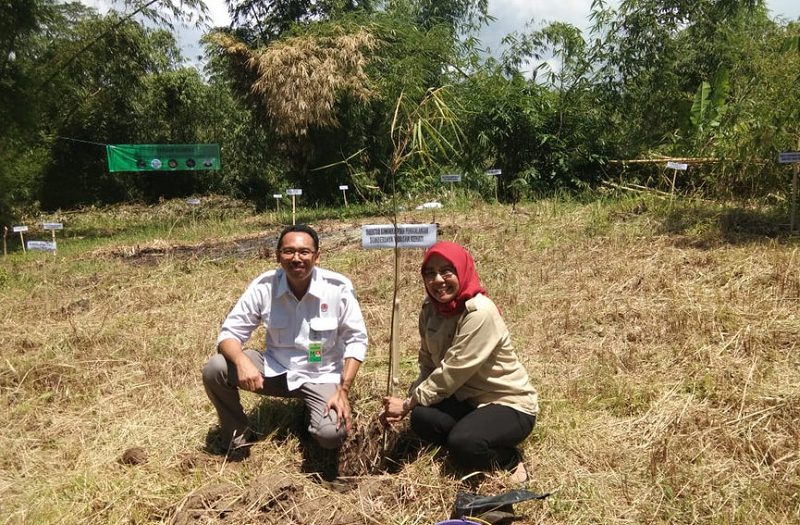TABAH BAMBOO CONSERVATION: SAVING WATER AND BENEFITING THE ECONOMY

-
Date:
08 Feb 2019 -
Author:
KEHATI
The Rarung Special Purpose Forest Area (KHDTK), Central Lombok, was planted with tabah bamboo by the KEHATI Foundation, PT CIMB Niaga, the Research and Development Center for Non-Timber Forest Product Technology (BP2T HHBK), the Udayana University Bamboo Research Center, and the Patuh Angen Forest Farmers Group (7/2).
The first harvest of tabah bamboo shoots from the 2015–2016 planting was completed in front of stakeholders and farmers in charge of the KHDTK land. Over a 7 hectare area, 3,700 more trees and tabah bamboo were planted at the same time. Around 2,500 tabah bamboo plants were previously planted in the region as a test run and concurrently on farmers’ land in the KHDTK area in the years 2015–2016. As a result, bamboo shoots can be harvested during the 2019 rainy season.
The KEHATI Foundation, PT CIMB Niaga, BP2T HHBK, the Bamboo Research Center at Udayana University, and the Patuh Angen Group used an agroforestry system to plant 3,700 strong bamboo in forest regions in 2018. The development of tabah bamboo in KDHTK is an attempt to enhance non-timber forest product kinds in forest regions with an agroforestry model that can boost the economy of managing farmers who live in forest areas. The purpose of this KHDTK, which has a 325 ha area and serves as a protected forest, according to the Head of Balai Bintarto Wahyu Wardana, is to safeguard springs, avoid landslides, and enhance the welfare of the local populace.
The community uses 415 of the 325 hectares of arable land. A research demonstration plot including kemiri sunan, nyamplung, crust grass for crafts, and honey patches is located inside.
In addition, this endeavor is very much in line with the local government’s strategy to include bamboo as an NTFP option in West Nusa Tenggara forest areas. The local government has made bamboo one of the focus plant species chosen to rehabilitate regions and develop them in forest areas and important lands, according to Oman Sumantri from the West Nusa Tenggara Provincial Forestry Service.
The Indonesian Biodiversity Foundation has been working with community organizations, the private sector, and academics since 2009 to carry out the conservation of bamboo, particularly species that have economic value in Java, Bali, NTB, and NTT. The preservation and use of bamboo has also grown to be one of the foundation’s primary areas of focus.
“A variety of bamboo species found in Indonesia are currently under danger.” The KEHATI Foundation’s Director of Communication and Resource Raising, Rika Anggraini, stated that the organization “really encourages the community to return to conserving germplasm, which has benefits for both the economy and the environment.”
“In NTB, it is evident that the results of the tabah bamboo planting in 2016 are very fertile and already productive, and they may provide the group with additional money. Along with seed assistance, we also offer training in cultivation and post-harvest processing and packaging as part of our partnership with PT CIMB Niaga,” he continued.
One of the positive qualities is the private sector’s support for conservation as a means of caring for the planet, the environment, and an endeavor to slow down the effects of climate change. “Environmental concerns are important to us as well. In order to preserve bamboo, our company has been working with KEHATI since 2013”. On this occasion, Susi Hermanses, communication development head for PT. CIMB Tbk, also supported the Patuh Angen Farmers Group by providing post-harvest processing equipment.
There are 1,600 different varieties of bamboo in the world, and 10% of them may be found in Indonesia. Although 160 species are held, many of them are already in danger of going extinct. Bamboo actually has a lot of advantages from an ecological, social, cultural, and economic standpoint. Because it can store water, absorb CO, and withstand landslides, this plant is an ecologically sound choice for protecting land. From a cultural perspective, the use of bamboo is a constant in Indonesian society. Additionally, bamboo may be converted into equipment for food, home, building, and art that will help the economy.
The bamboo variety known as tabah has the potential and likelihood of having commercial significance. According to Diah Kencana, a lecturer and adamant bamboo expert at Udayana University, this bamboo may be picked constantly for up to 100 years and still grow. The stems and shoots of tabah bamboo can also be used to prepare food. The major product of tabah bamboo is bamboo shoots, which have a bland, non-bitter taste and low amounts of HCN, making them safe for consumption.
According to Diah, tabah bamboo is marketed for sale to a number of nations, including China, Korea, and Japan, all of which demand hygienic practices. The tabah bamboo market is still very open because there is still a lack of supply in domestic markets like Bali in addition to the export market.
Farmers in charge of the KHDTK area expect the economic element as well. “In addition to the vanilla, candlenut, honey, and coffee that are grown in our country, tabah bamboo shoots can be a source of additional revenue”, said The Head of the Compliance Group, Angen Syukri, who has been cultivating tabah bamboo at KHDTK. He also stated that the results of the planting from three years ago can be taken from the shoots. Syukri and his team have planted over 7,200 trees. Bamboo shoots, which typically only survive a week, can now be preserved for up to a year without compromising their safety for food because to advancements in technology.
Future development of tabah bamboo in West Nusa Tenggara forest areas may be a solution for ensuring local food security. However, to do this, all parties must support and work together, particularly NTB stakeholders from districts, provinces, and associated UPTs.
